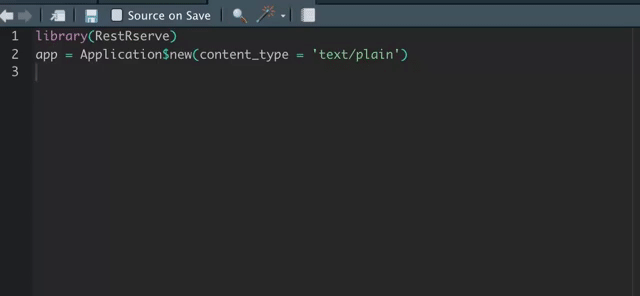RestRserve is an R web API framework for building high-performance AND robust microservices and app backends. On UNIX-like systems and Rserve backend RestRserve handles requests in parallel: each request in a separate fork - credits go to Simon Urbanek.
Creating application is as simple as:
library(RestRserve)
app = Application$new()
app$add_get(
path = "/health",
FUN = function(.req, .res) {
.res$set_body("OK")
})
app$add_post(
path = "/addone",
FUN = function(.req, .res) {
result = list(x = .req$body$x + 1L)
.res$set_content_type("application/json")
.res$set_body(result)
})
backend = BackendRserve$new()
backend$start(app, http_port = 8080)Test it with curl:
curl localhost:8080/health
# OK
curl -H "Content-Type: application/json" -d '{"x":10}' localhost:8080/addone
# {"x":11}Using convenient .req, .res names for handler arguments allows to leverage autocomplete.
- follow quick start guide on http://restrserve.org/ for more details.
- see "Articles" section on https://restrserve.org/
- check out examples on https://github.com/rexyai/RestRserve
- Stable, easy to install, few dependencies
- Concise and intuitive syntax
- Well documented, comes with many examples - see inst/examples
- Fully featured http server with the support for URL encoded and multipart forms
- Build safe and secure applications - RestRserve supports https, provides building blocks for basic/token authentication
- Raise meaningful http errors and allows to interrupt request handling from any place of the user code
- Saves you from boilerplate code:
- automatically decodes request body from the common formats
- automatically encodes response body to the common formats
- automatically parses URI templates (such as
/get/{item_id}) - helps to expose OpenAPI and Swagger/Redoc/Rapidoc UI
- It is fast!
install.packages("RestRserve", repos = "https://cloud.r-project.org")Debian and Alpine based images are available on docker-hub -https://hub.docker.com/r/rexyai/restrserve/
docker pull rexyai/restrserveYou can also install specific version (and we encourage to do so):
docker pull rexyai/restrserve:1.2.0-alpineGuidelines for filing issues / pull requests - CONTRIBUTING.md.
- Simon Urbanek (@s-u) for awesome Rserve and all the work on R itself and on his other packages
- Jeff Allen (@trestletech) for his work on Swagger UI in plumber (from where we took inspiration for our implementation)
- Brodie Gaslam (@brodieG) for help with understanding on how to get traceback from try-catch function calls. Also thanks Hadley Wickham (@hadley) for
evaluate::try_capture_stackfunction which we use for this purpose.
- RestRserve is primarily tested on UNIX systems. While it works natively on Windows please don't expect it to be as performant as on UNIX-like systems. If you really want to use it on Windows - consider to use Windows Subsystem for Linux.
- Keep in mind that every request is handled in a separate process (fork from a parent R session). While this feature allows to handle requests in parallel it also restricts reuse of certain objects which are not fork-safe (notably database connections, rJava objects, etc)



